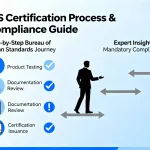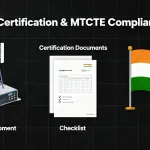Monsoons are here, and the weather’s become a game of lucky dip. Some days are cool and breezy, while others are sticky, like a melted candy bar.
Air conditioners? No longer just luxury items. They’ve become as essential as morning coffee or an umbrella during a rainstorm. They’re the superheroes, keeping us safe from the arch-nemesis – Mr Humidity.
The weather might swing like a seesaw, from soothing breezes to clingy humidity. Yet, like a dependable friend, the air conditioner is always there to restore comfort.
Whenever the monsoon gets tricky, remember the superhero—the air conditioner. It’s not just a fancy appliance; it’s the real champion of the monsoon season!
However, did you know that an air conditioner can be extremely harmful to your overall health?
It is important for an air conditioner (or any electrical appliance) to undergo product compliance like BIS and EPR compliance before it can be sold in the market. Product compliance ensures that the air conditioner meets the necessary safety, quality, and regulatory requirements to protect consumers and prevent potential hazards.
Ever wondered what the star ratings on the air conditioners meant?
The star rating system on air conditioners provides a summary of their energy efficiency. It helps consumers understand the relative energy consumption and potential cost savings of different models. Higher star ratings generally indicate more energy-efficient air conditioners, while lower ratings suggest higher energy consumption. By considering the star rating, consumers can make informed choices based on their preferences, budget, and long-term energy cost considerations. But, the one aspect that goes amiss, is whether or not all of these electronics are compliant enough or not!
Air conditioners must pass regulatory compliance e.g., BIS and EPR compliance to ensure they meet necessary safety, quality, and environmental standards. Regulatory compliance is essential to protecting consumers from potential hazards associated with air conditioner usage. This can be ascertained by checking if air conditioners have BIS and EPR certificates. Compliance regulations cover aspects such as electrical safety, fire safety, mechanical safety, and environmental considerations like refrigerant usage. By adhering to these regulations, air conditioner manufacturers demonstrate their commitment to producing safe and reliable products. Regulatory compliance also helps maintain industry standards, promotes fair competition, and protects the environment by regulating energy efficiency and refrigerant usage.
Following are some of the attributes that are taken into consideration via the compliance landscape:
Standards and Regulations: Various countries and regions have established standards and regulations for air conditioners, including guidelines on installation, maintenance, and indoor air quality. Adherence to these guidelines helps to ensure that air conditioning systems are safe and pose minimal health risks.
Regular Inspections: Compliance standards often mandate regular inspections of air conditioning systems. These inspections are designed to catch any potential issues early before they pose significant health hazards.
Maintenance Requirements: A key aspect of compliance involves regular and appropriate maintenance. This not only includes cleaning filters and coils but also checking for microbial contamination and ensuring the system is functioning optimally. Adherence to these standards reduces the risk of respiratory problems and the spread of infectious diseases.
Quality Control: Compliant air conditioners are required to meet strict quality control standards. This includes being designed in a way that minimizes the risk of dry skin and eyes, as well as other health issues.
The compliance landscape plays a crucial role in mitigating the potential health hazards of air conditioners. Compliant air conditioners i.e., which have got BIS and EPR compliance done, adhere to stringent regulations and guidelines on installation, maintenance, and indoor air quality. These rules ensure early detection and resolution of issues through regular inspections and thorough maintenance, which in turn minimizes health risks like respiratory problems and disease spread. Additionally, these regulations guarantee that trained professionals install and maintain air conditioners to meet strict quality control standards. Therefore, despite the potential health risks, a compliant air conditioner—meticulously designed, tested, and maintained—significantly reduces these hazards, making it a safe option for consumers managing indoor climates, even in the fluctuating monsoon season.





